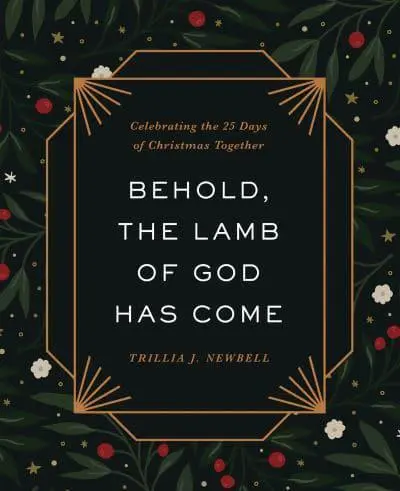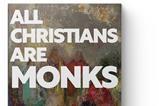Trillia Newbell’s latest devotional offers 25 daily readings for Advent, complete with recipes and reflections. Despite some seasonal confusion in the title, this accessible book provides a refreshing take on preparing for Christmas, says our reviewer

Based in Nashville, Tennessee, and already the author of three previous books, Trillia Newbell is no stranger to writing books that capture the vitality and essence of Christian life. Her latest release, Behold the Lamb of God Has Come: Celebrating the 25 days of Christmas Together (Harvest), is a worthy addition to her body of work – one that will no doubt resonate with her loyal readers.
That said – and this may sound a touch pedantic – the book begins with one or two obvious conceits that some readers might find misleading. The title speaks of “celebrating Christmas,” yet this is, in fact, a book for Advent – the four weeks leading up to Christmas – rather than Christmastide, which runs from 24 December to 5 January. Moreover, as many Christians will know, Advent traditionally lasts 28 days, while Christmastide spans 12 – not the 25 days suggested by the book’s title. So, setting aside these titular confusions, how does the book overcome its seasonal ambiguities?
Newbell makes it clear from the outset that this is a devotional book, designed to be read daily from 1 December through to Christmas Day.
She offers a refreshing perspective on how we might use that time in preparation for celebrating Christ’s birth.
Rather than treating Advent as a period of waiting for Jesus to arrive – as though he has not already come – Newbell begins from the reality that he has been present with us for over 2,000 years. The invitation, then, is to spend the month before Christmas to remind ourselves of the stories of his life and deepening our understanding of his significance on earth. Though this may not be the traditional approach to Advent, it is perhaps the more realistic one – recognising how easily many of us become distracted in the lead-up to Christmas, and how often we treat the celebration as over by Boxing Day, rather than just beginning.
To fulfil this aim, Newbell offers 25 daily readings spread across five weeks. Each week opens with a hymn, followed by a psalm and three Bible passages, each accompanied by a short reflection and prayer. Every day also includes thoughtful discussion questions, encouraging readers to engage with family or friends as they journey through Advent together.

Perhaps anathema Christian purists who still might view Advent as a penitential season where fasting should abound, Newbell includes festive food and drink recipes to accompany the journey – one for the end of each week. These range from traditional treats like wassail and gingerbread cookies to indulgent creations such as a no-bake peppermint cheesecake, rich Christmas fudge, and the intriguingly named “Christmas Puppy Chow” – which readers will have to discover for themselves.
For those seeking deeper reflection, the readings explore a rich range of themes – from Old Testament prophecies fulfilled in Christ, to the incarnation, temptation, and trial of Jesus; the significance of Passover and Easter; the world’s longing for a saviour; and Jesus as the Prince of Peace. Newbell also considers what it means to be “in Christ,” and unpacks the meanings of faith, joy, and love. Yet even in the more serious moments, her writing is imbued with little gentle, pertinent, and thought-provoking humour (for example Mary’s news to Joseph: “Surprise – we’re having a baby! Oh, and it’s not yours”).
At just 128 pages and written in clear, accessible language, Behold the Lamb of God Has Come is an easy yet meaningful read. Despite its simplicity, it remains informative, thought-provoking, and gently attuned to those for whom Christmas is not always a season of joy and celebration, but one marked by loss or hardship. Each day’s reflection is accompanied by attractive seasonal artwork, enhancing the book’s visual appeal.
So, has Newbell succeeded in her aim to deepen our understanding of Christmas and the life and meaning of Jesus, while remaining realistic about the pressures of modern life? Arguably, yes – though this may well be a ‘Marmite book’. If you can look past the objections to the anomalies in the title, don’t mind singing carols a little early, are open to rethinking how Advent might be observed, and can embrace a few indulgent recipes before Christmas Day even arrives, then this book offers a refreshing and thoughtful perspective on the season.







































No comments yet